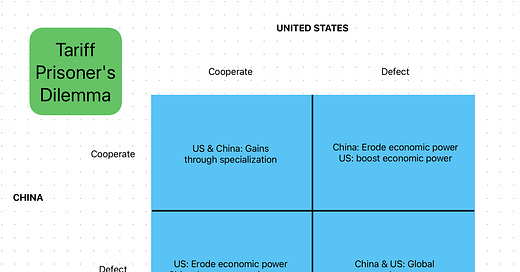I've spent the weekend scratching my head and reading way too much tariff analysis, because nothing about liberation day makes sense to me on the surface. But this morning I had a conversation that pointed me in an intriguing new direction: game theory.
I'm reading William Poundstone's book Prisoner's Dilemma, which means it's top of mind. The prisoner's dilemma basically describes any scenario where two players have the choice to "cooperate" or "defect". If they both cooperate, the outcome is a good outcome for both players. However, if one cheats while the other one doesn't, then the cheater wins big. If both players cheat, then nobody wins—but nobody really loses either.
You can follow the logic: everyone is expected to cheat, because with that strategy there's a chance you might win big and no chance of losing. Upside, and no downside. But of course if you decide to play fair, there's huge downside. You might be the "sucker" and then the cheater wins big at your expense.
Now imagine that Trump views US trade relations as a series of prisoners dilemmas. What's worse, he believes that the scoreline is determined by the trade deficit: if there is a large deficit, it means the US has been taking the "sucker" position in the game. The lower left quadrant. Here's how it looks vis a vis China:
Now imagine that same chart multiplied time and again for each country in the rest of the world — including the ones populated only by sheep and penguins.
It is true enough that China has taken a durable and sometimes public stance of being a net exporter to enrich its elites at the expense of other economies. The Chinese state may intervene to pick winners in domestic businesses, disappear CEOs it does not like, or require foreign companies to hand over expensive intellectual property in order to sell into the Chinese market... and that IP sometimes then shows up at half the price from local competition. So maybe it's believable that the U.S. is in the sucker position.
So what's the play? How do you get out of the prisoner's dilemma? My favorite example is from (apparently) a game show I've never watched except for this incredible clip with terrible audio. It's worth watching:
The answer: Convince the other player that you're going to steal, and then cut a deal outside the rules of the game.
Back to Trump.
We appear to have a president who is willing to take this truck of a country, with the rest of the world's economy tow-hitched to the back of it, off one hell of a big cliff. In fact, he's more than willing: he really wants to. He thinks the United States will do just fine if it has to just produce things inside the country. Really it just means more jobs for his constituency.
The more convincing this is, the more willing other countries will be to cut a deal.
OK, so there are holes in this theory.
For one thing, it credits Trump with trying to create a win-win and his thinking always looks very zero-sum. For another, trade imbalances are not really a prisoner's dilemma, because in the thought experiment the players can't communicate with each other and won't have an ongoing relationship. And a third flaw: it ascribes intelligent planning to what looks like erratic behavior.
But still...
This is a hell of a gamble. If Trump manages to pull it off. If China blinks, and Europe follows, and the markets recover based on expectations of domestic growth and long-term sustainable U.S. finances, and then we actually see domestic growth and investment, he’ll get accolades for generations.
If he doesn’t pull it off. If he loses domestic support, and Congress nabs control back and neuters the tariffs before he gets meaningful concessions from China, then I suspect he’ll be cooked.



